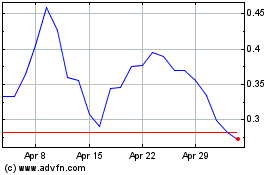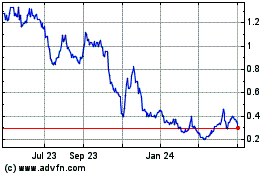Phenoxodiol Delays Tumor Progression in Late-Stage Hormone Refractory Prostate Cancer
November 17 2005 - 12:30PM
PR Newswire (US)
Long Term Phase Ib/IIa Study Presented at AACR-NCI-EORTC Meeting
Showed Significant Anti-Tumor Effects and No Toxicity PHILADELPHIA,
Nov. 17 /PRNewswire-FirstCall/ -- A new study presented today at
the International Conference on Molecular Targets and Cancer
Therapeutics in Philadelphia shows that phenoxodiol significantly
delays tumor progression in men suffering from late-stage hormone
refractory prostate cancer. The meeting is sponsored by the
American Association of Cancer Researchers (AACR), the National
Cancer Institute (NCI), and the European Organization for Research
and Treatment of Cancer (EORTC). The anti-tumor effect in this
Phase Ib/IIa trial was dose-dependent. The trial was designed to
end after 24 weeks of treatment, but had to be extended to the
current 90 weeks because of the unexpected extended survival in
some patients. Patients have been able to remain on phenoxodiol for
this extended time without any evidence of toxicity. Researchers
administered various doses (20, 80, 200 and 400 mg) of phenoxodiol
to men with metastatic, hormone-refractory prostate cancer to
establish what level of anti-cancer effect the oral dosage form of
this drug would provide and whether there was a dose-dependent
effect. The phenoxodiol was administered in monthly treatment
cycles comprised of 3 doses daily for 21 consecutive days followed
by 7 days without treatment. The original plan was to treat
patients for a maximum of 6 treatment cycles. Except for anti-
androgen therapy being continued in those who were receiving it
pre-trial, phenoxodiol was the only treatment. The age of the 26
subjects studied ranged from 55 to 85, the Gleason score was mean
8.04 (range 6-9), and the mean baseline PSA level was 56.3 pg/ml.
Response to therapy in these patients was determined on the basis
of PSA response (a decline in PSA level compared to baseline of at
least 50 percent), PSA doubling time (time for the baseline PSA
level to double), and time to progression (length of time that
patients remained on phenoxodiol based on PSA levels and clinical
assessment). "The two highest dosages of phenoxodiol provided a
significant anti-tumor response in a disease that is normally
unresponsive to treatment in its late stages," says Robert Davies,
MD, lead investigator of the study and urologist at Sir Charles
Gairdner Hospital in Perth, Australia. "We found that the PSA
level, an indicator of the level of cancer, decreased. We also saw
a clinical response that was prolonged in some patients." Combining
the data from the 2 lowest dosages (12 patients) and the 2 highest
dosages (14 patients), the number of patients still on therapy
after 6 months increased from 1 out of 12 (8.5 percent) to 10 out
of 14 (71.4 percent), and the mean time to progression (length of
time patients were deemed to be deriving a benefit from therapy)
increased from 15 weeks to 47 weeks. This latter figure does not
take into account 4 patients who remain on therapy after 42, 74, 82
and 90 weeks. In terms of PSA levels, there were no PSA responses
in the two lowest dosage groups, but 3 of the 14 in the two highest
dosage groups experienced a PSA level reduction of 50 percent or
greater from baseline. The PSA doubling time increased from a mean
18 weeks to 43 weeks, not including the 3 of 14 patients who remain
on phenoxodiol therapy and whose PSA levels have yet to double.
While it was not possible to measure tumor size in this study, an
increase in PSA doubling time is generally regarded as reflecting a
tumor response. "The long-term anti-tumor effects and safety
demonstrated in this study are very encouraging developments," said
Graham Kelly, Ph.D, Chairman of Marshall Edwards, Inc. Professor
Kelly presented the data on behalf of the investigators in the
12:30 - 2:30 pm poster session on Thursday, November 17, at the
AACR-NCI-EORTC meeting. A Californian oncologist who referred two
patients to the trial agrees that the results are good news, and
may impact the way prostate cancer is treated. "Phenoxodiol
represents a unique new class of drugs for men with prostate
cancer," says Steven Tucker, MD, Director of Prostate and
Genitourinary Oncology at The Angeles Clinic & Research
Institute in Los Angeles. "If the clinical benefit seen in these
refractory patients can be extended into an earlier disease state,
we may be looking at a paradigm shift in the management of advanced
prostate cancer," says Dr. Tucker, who is also an Assistant
Clinical Professor of Medicine at the UCLA School of Medicine.
Professor Kelly said that the next stage of development of
phenoxodiol for prostate cancer would be to use it in patients who
have failed to respond to both hormone therapy and docetaxel
therapy. "On the basis of this data, we would expect that
phenoxodiol alone would offer these patients a significant survival
benefit, but we also will be interested in testing the ability of
phenoxodiol to restore sensitivity to docetaxel in these end-stage
patients," Professor Kelly added. This next study will be conducted
in the U.S. and is planned to commence enrollment in 2006. About
Prostate Cancer According to data provided by the American Cancer
Society (ACS), prostate cancer is one of the most common types of
cancer found in American men, second only to skin cancer. ACS
estimates that there will be more than 232,000 new cases of
prostate cancer in the United States in 2005 and about 30,350 men
will die of this disease. One man in 6 will get prostate cancer
during his lifetime, and 1 in 34 will die of the disease. Most
cases of prostate cancer are sensitive to male sex hormones
(androgen), and blocking of the effect of these hormones is a
common therapeutic process. Ultimately, however, most prostate
cancers become insensitive to androgens, at which time the tumor is
referred to as being hormone refractory. The approved anti-tumor
therapy for these patients is docetaxel (Taxotere(R)), which has
been shown to provide a modest extension of survival in some
patients, before the tumors become docetaxel-refractory.
Hormone-refractory, docetaxel refractory patients represent the
end-stage of this disease. About Phenoxodiol Phenoxodiol is being
developed as a therapy for late-stage, chemo- resistant prostate,
ovarian and renal cancers. Phenoxodiol targets the tumor cell's
cation excretion pump, with the resulting disruption to the cell's
redox potential producing a range of biochemical effects including
inhibition of phosphorylation of the key pro- survival
sphingosine-1-phosphate and Akt signalling pathways. Inhibition of
production of anti-apoptotic proteins including XIAP is a key
biochemical outcome. The mechanism of action of phenoxodiol
suggests a potential to be used both as a monotherapy and in
combination with standard anti-cancer drugs where it acts to
enhance the efficacy of those drugs in chemo-sensitive patients and
to restore sensitivity to those drugs in chemo-resistant patients.
Phenoxodiol currently is undergoing clinical studies in the US and
Australia. Phenoxodiol is an investigational drug and, as such, is
not marketed in the US. More information about phenoxodiol can be
found at http://www.phenoxodiol.com/. About Marshall Edwards, Inc.
Marshall Edwards, Inc., (NASDAQ:MSHL) has licensed rights to bring
phenoxodiol to market globally from its parent company, Novogen
Limited (NASDAQ:NVGN) (ASX:NRT). Novogen is developing a range of
therapeutics across the fields of oncology, cardiovascular disease
and inflammatory diseases based on its phenolic drug technology
platform. More information on the Novogen group of companies can be
found at http://www.novogen.com/. Under U.S. law, a new drug cannot
be marketed until it has been investigated in clinical trials and
approved by the FDA as being safe and effective for the intended
use. Statements included in this press release that are not
historical in nature are "forward-looking statements" within the
meaning of the "safe harbor" provisions of the Private Securities
Litigation Reform Act of 1995. You should be aware that our actual
results could differ materially from those contained in the
forward-looking statements, which are based on management's current
expectations and are subject to a number of risks and
uncertainties, including, but not limited to, our failure to
successfully commercialize our product candidates; costs and delays
in the development and/or FDA approval, or the failure to obtain
such approval, of our product candidates; uncertainties in clinical
trial results; our inability to maintain or enter into, and the
risks resulting from our dependence upon, collaboration or
contractual arrangements necessary for the development,
manufacture, commercialization, marketing, sales and distribution
of any products; competitive factors; our inability to protect our
patents or proprietary rights and obtain necessary rights to third
party patents and intellectual property to operate our business;
our inability to operate our business without infringing the
patents and proprietary rights of others; general economic
conditions; the failure of any products to gain market acceptance;
our inability to obtain any additional required financing;
technological changes; government regulation; changes in industry
practice; and one-time events. We do not intend to update any of
these factors or to publicly announce the results of any revisions
to these forward-looking statements. DATASOURCE: Marshall Edwards,
Inc. CONTACT: David Sheon, +1-202-518-6384 or Cathy Purcell,
+1-202-285-0370, both for Marshall Edwards, Inc.; or Professor
Graham Kelly of Marshall Edwards, Inc., +1-203-247-1322 Web site:
http://www.novogen.com/ http://www.phenoxodiol.com/
Copyright
Kazia Therapeutics (NASDAQ:KZIA)
Historical Stock Chart
From Jun 2024 to Jul 2024

Kazia Therapeutics (NASDAQ:KZIA)
Historical Stock Chart
From Jul 2023 to Jul 2024
